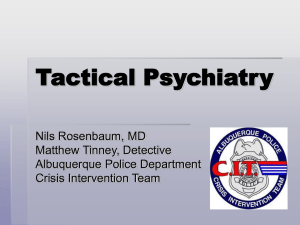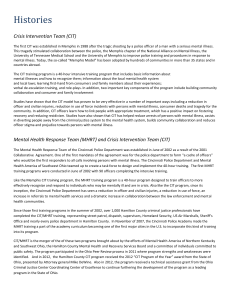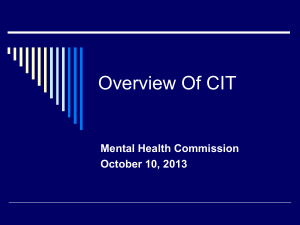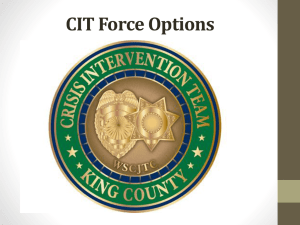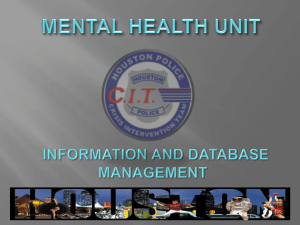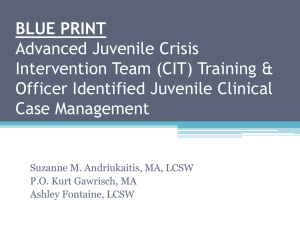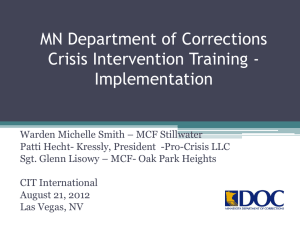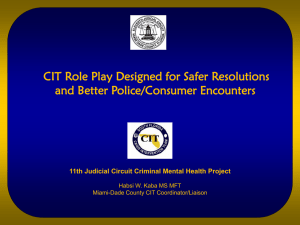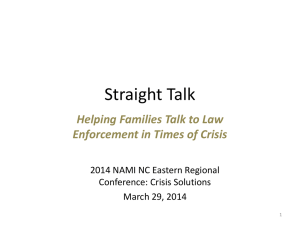The Chicago Crisis Intervention Team Collaboration
advertisement
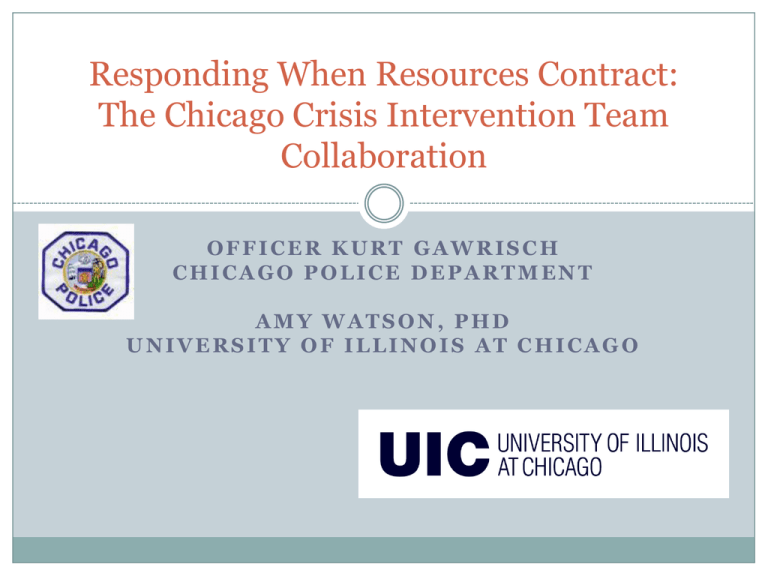
Responding When Resources Contract: The Chicago Crisis Intervention Team Collaboration OFFICER KURT GAWRISCH CHICAGO POLICE DEPARTMENT AMY WATSON, PHD UNIVERSITY OF ILLINOIS AT CHICAGO Overview CIT in Chicago History and model Findings to date Advanced CIT CIT-Youth CIT-Veterans Contracting Resources The Chicago Crisis Intervention Collaboration Identifying and addressing system gaps Ongoing expansion of CIT capacity CIT in Chicago Training developed in collaboration with community providers & advocates & stakeholders Began in 2 pilot districts in 2004 30-40 officers/supervisors per district Citywide (all 22 districts) implementation began 2006 To date, 1700 officers trained in basic CIT (~1,000 in districts currently) Involving people in recovery in the training process: Collaboration with the Thresholds Theatre Arts Program& NAMI-GC Findings to Date Testing a systems level intervention to improve police response to persons with mental illness: CIT in Chicago 2008 NIMH funded Study of CIT in 4 Chicago police districts CIT trained officers directed 18% more call subjects to MH services than non CIT peers Linkage more likely in districts with more MH services CIT officers used less force at higher levels of resistance Current study examining CIT and MH service access in all 22 districts Advanced CIT-Youth In 2009, CPD and NAMI-GC collaborated to develop an advanced training course addressing mental illness among the youth population In 2010, the Illinois Criminal Justice Information Authority (ICJIA) provided NAMI-GC with funding to implement the Crisis Intervention Team for Youth (CIT-Y) program within the Chicago Police Department (CPD). This was the FIRST CIT-Y program in the country CIT-Y training goals Advance officer knowledge of youth mental illness. Decrease the likelihood that violent interactions will occur when law enforcement officers respond to crises involving youth with mental illnesses. Reduce the number of mentally ill youth involved in the juvenile justice system. Advanced CIT-Youth (CIT-Y) Evaluation ongoing by ICJIA (R.Skorek) Focus Groups and Surveys suggest Overall, participants were very satisfied with the CIT-Y training content and delivery. Officers reported applying CIT-Y techniques in their work, particularly within schools and housing developments Barriers to practicing CIT-Y identified CIT-Y Case Management Program Partnerships between NAMI-GC and local Social Work and Psychology programs Outreach to youth and families referred by CIT-Y officers Linkage and case management Advanced CIT Veterans In 2009, CPD collaborated with the Veteran’s Reintegration Initiative (VRI) in Illinois to develop an advance training addressing Veteran’s issues. Illinois Department of Human Services Illinois Department of Corrections Cook County and Rock Island County Mental Health Courts and Probation Community Mental Health Providers Veteran’s Administration Funded by grant awarded by the Substance Abuse & Mental Health Services Administration (SAMSHA) to the Illinois Department of Human Services which funded VRI. Training Emphasis Street level diversions Recognition of signs and symptoms of disorders common to veterans Information and transportation to mental health resources Contracting Resources Ongoing cuts to mental health service budgets-transition to fee for service billing and cuts to funds for persons not receiving Medicaid or other coverage Closure of 6 o12 City of Chicago Mental Health clinics in 2011 Closure of Community Mental Health Council clinics serving the south side of the city Growing need Chicago drop off sites and MH providers The Chicago Crisis Intervention Collaboration: CCIC Initial Collaboration on BJA expansion grant Expands and re-invigorates cross system partnerships and problem solving Identification of gaps-effective linkage to services following CIT encounter CCIC Pilot linkage project Pilot two police districts; 19 and 24 Expand collaboration with Thresholds and IL Masonic Medical Center Emergency Room 3 of 4 police referrals (voluntary/involuntary) are not admitted to the inpatient psychiatric unit and release without linkage to treatment Thresholds will provide direct service or will make referrals, regardless of the ability to pay Designate a 24 hour Hotline number used by Illinois Masonic ER / CPD and voluntary consent form Create Intake & Assessment Specialist (LCSW) responsible for linkage to community resources Discussion & Questions Thank you For more informationOfficer Kurt Gawrisch Chicago Police Department 312-745-5745 kurt.gawrisch@chicagopolice.org Amy C Watson, PhD University of Illinois at Chicago 312 996-0039 acwatson@uic.edu



